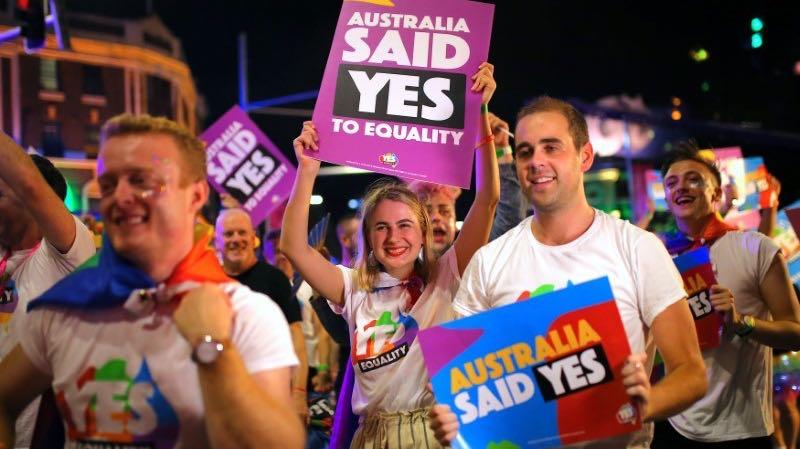Thousands pour into Sydney to celebrate the 40th anniversary of the Gay and Lesbian Mardi Gras
Participants hold banners regarding same-sex marriage during the 40th anniversary of the Sydney Gay and Lesbian Mardi Gras Parade in central Sydney, Australia, March 3, 2018.
About half a million people are expected to line Sydney's streets on Saturday to celebrate the 40th anniversary of the Gay and Lesbian Mardi Gras, the first time the annual parade has taken place since Australia legalized same-sex marriage.
The event started in 1978 as a protest march for gay rights and the decriminalization of homosexuality but has since grown into a major tourist spectacle featuring leather, sequins, glitter, lasers and dance music. It is now Sydney's biggest street party and a major focal point for Australia's gay and lesbian community.
This year's procession includes 200 floats and groups of street dancers and will be headed by Dykes on Bikes, a motorcycle club.
Pop superstar Cher will headline the parade's official party, the first since Australia in December became the 26th nation to legalize same-sex marriage.
Australians overwhelmingly endorsed legalizing same-sex marriage in a postal survey in a country where sodomy laws were still in place in some states until as recently as the 1990s.
This year's Mardi Gras will honor the 78ers, a group of people involved in the original protest, which took place on June 24, 1978, as a peaceful march for gay rights that sparked the annual parade.
That protest was marred by police brutality with 53 people arrested in subsequent scuffles.
Police have since apologized for the events of 1978 and now march each year in the parade alongside other emergency services.
Bruce Pollack, a Mardi Gras volunteer since 1984, said the parade has played a major role in changing attitudes toward the LGBT community over the decades.
"I was involved in the gay and lesbian counseling service … you would always hear young gays, and older gays, and much older gays say, 'It's OK to come out because I saw people like me in the parade enjoying themselves — and there were spectators,'" Pollack told Reuters. "It was Mardi Gras that made it OK to be gay and lesbian and bisexual and transgender."
(Reporting by Alison Bevege; Editing by Sam Holmes)
Our coverage reaches millions each week, but only a small fraction of listeners contribute to sustain our program. We still need 224 more people to donate $100 or $10/monthly to unlock our $67,000 match. Will you help us get there today?
